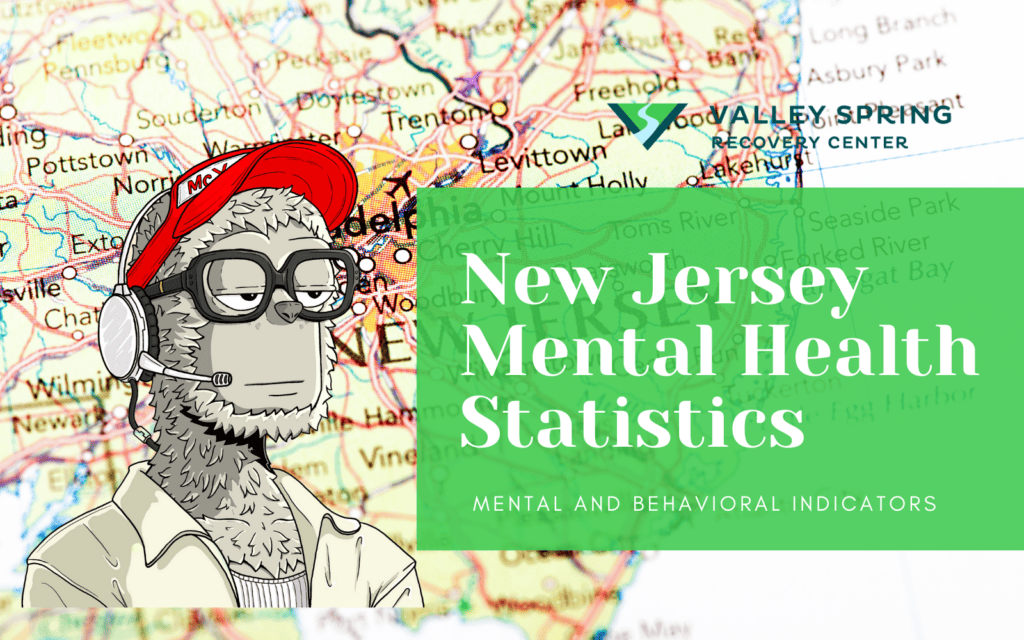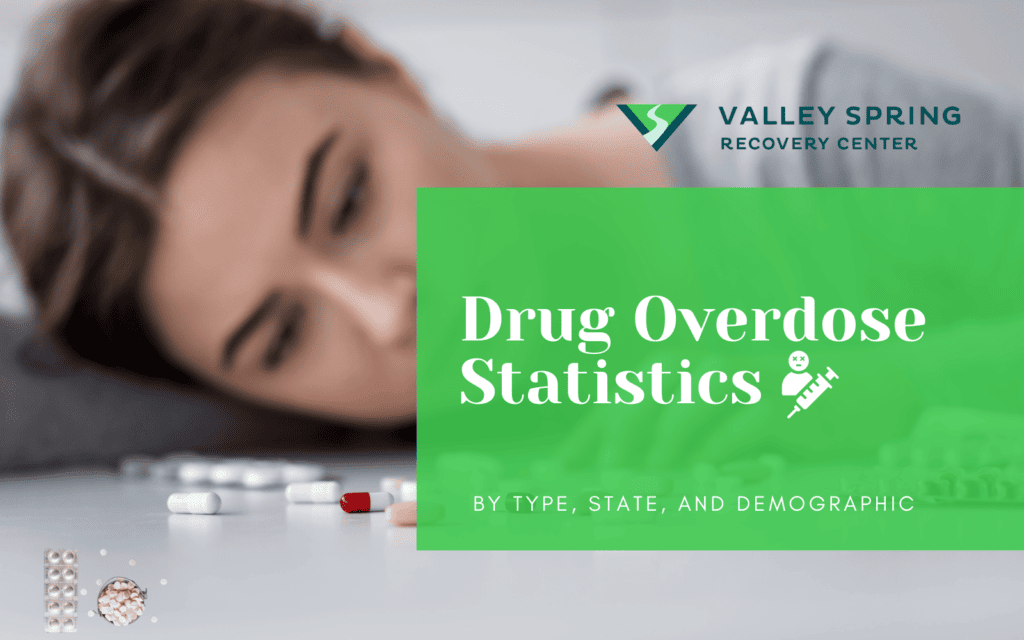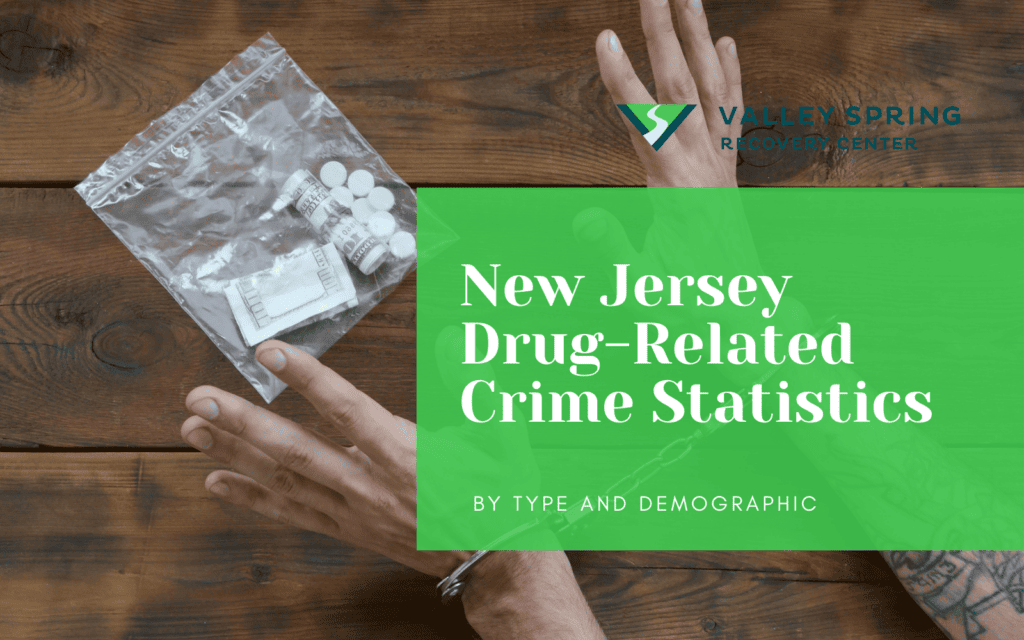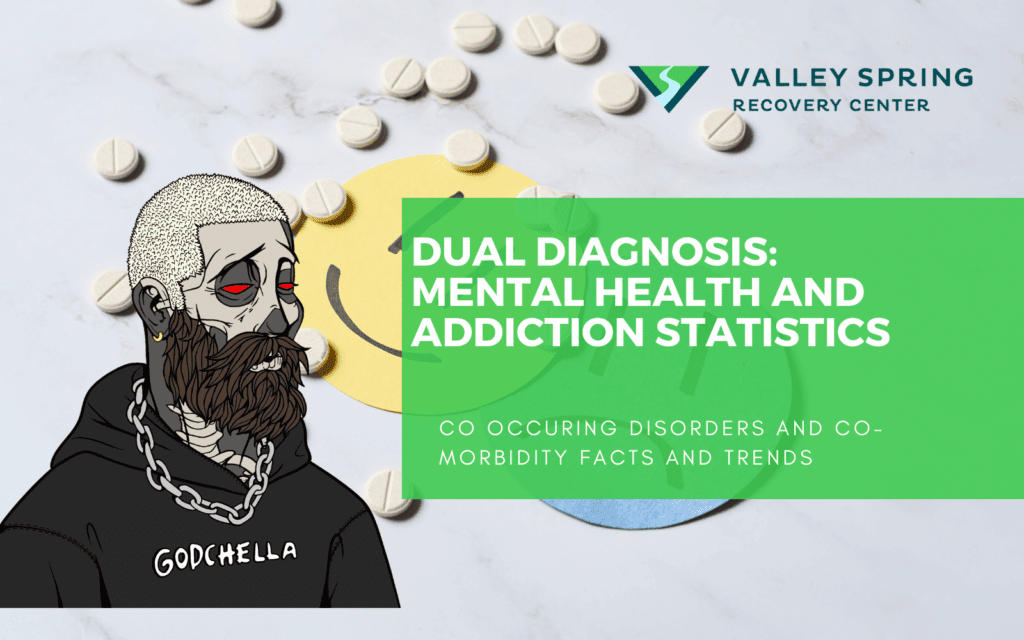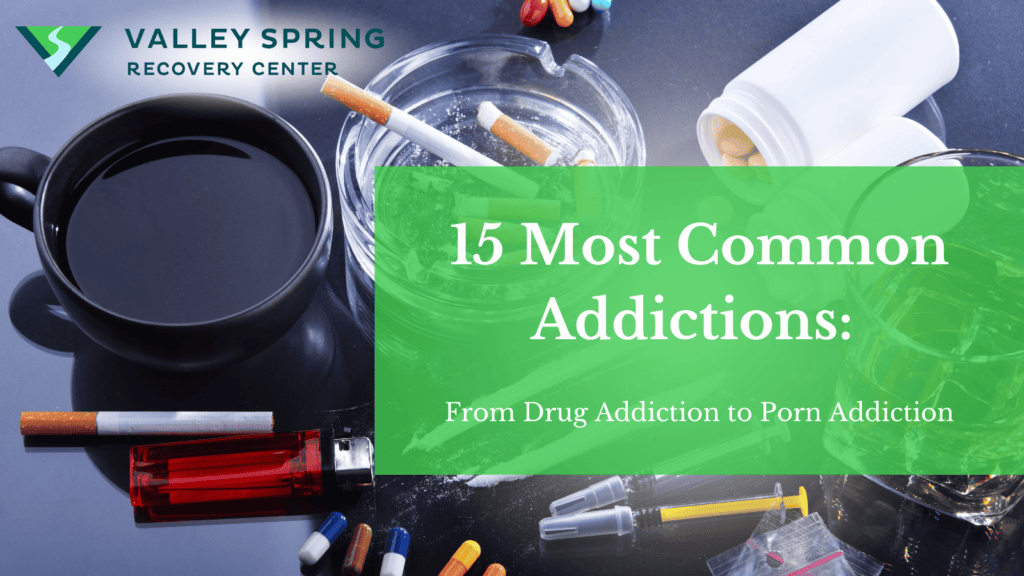Mental health issues in New Jersey have become more evident, with 27.7% of adults showing signs of anxiety or depression in 2023, and 37% indicating their mental health was affected by the COVID-19 pandemic according to KFF State Health Facts updated in 2023.
Significant impacts were noted among young adults and high school students, with a notable portion of individuals with severe mental illness experiencing arrest. However, New Jersey surpasses the national average in meeting the demand for mental health professionals.
KEY TAKEAWAYS:
- 27.7% of adults in New Jersey exhibited signs of anxiety or depression in 2023 (compared to 32.3% nationally).
- 37% of New Jersey residents reported their mental health being impacted by the COVID-19 pandemic (30% worsened, 7% improved).
- More than a third of young adults (18-29) experienced anxiety or depression symptoms during the COVID-19 pandemic, with women being disproportionately affected.
- High school students with depression are twice as likely to drop out compared to their healthy counterparts.
- Approximately 25% of individuals with severe mental illness have been arrested at least once.
- New Jersey fulfills 72.7% of the demand for mental health professionals, exceeding the national average (27.7%).
What Is The Prevalence Of Mental Health Issues In New Jersey?
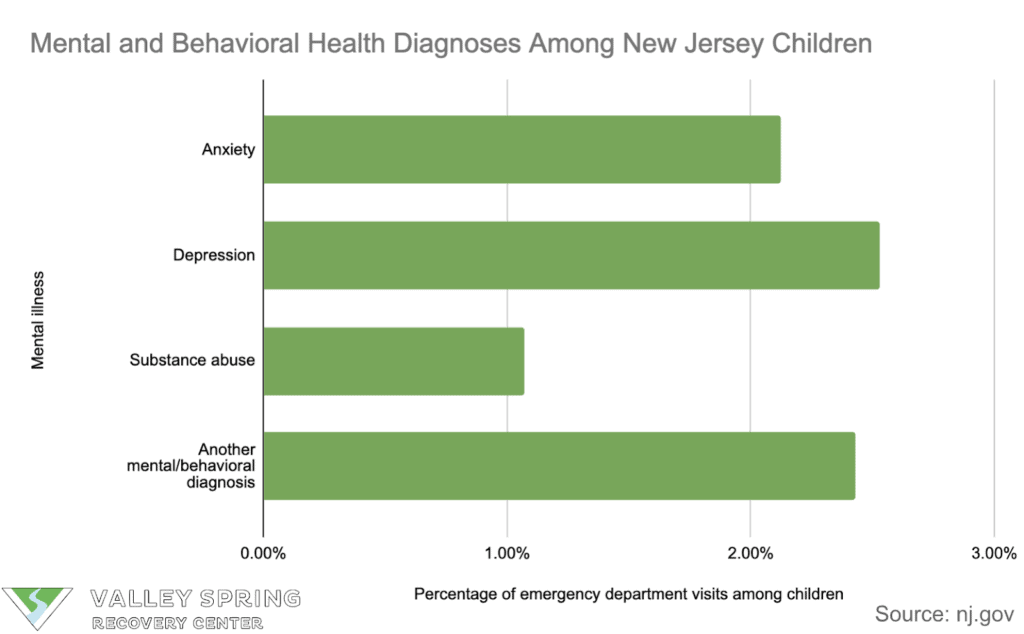
The prevalence of mental health concerns in New Jersey has risen to a significant degree. Residents across the state struggle with anxiety, depression, and other mental health challenges. These conditions have a debilitating impact that affects daily life, productivity, and overall well-being.
- Between February 1 and 13, 2023, 27.7% of New Jersey adults exhibited signs of anxiety and/or depressive disorder, in contrast to 32.3% of adults across the United States.
- In February 2021, 42.2% of adults residing in New Jersey expressed symptoms indicative of anxiety or depression.
- In 2021, a total of 1,112,000 adults in New Jersey were diagnosed with a mental health condition.
- An estimated 248,000 adults in New Jersey were living with a serious mental illness in the year 2021.
- In 2021, 14% of New Jersey adolescents aged 13-17 encountered mood disorders, 32% grappled with anxiety disorders, and 19% dealt with behavior disorders. Among children aged 3-17, prevalent mental illness diagnoses included attention-deficit/hyperactivity disorder (ADHD), behavioral/conduct issues, anxiety, and depression.
- The breakdown of mental and behavioral health diagnoses among children (17 years and under) in New Jersey emergency department visits in 2020.
- High school students experiencing depression are over twice as likely to discontinue their education compared to their counterparts who do not have depression.
- Approximately 25% of individuals with a severe mental illness have been apprehended by law enforcement at least once in their lifetime. This accounts for over 2 million incarcerations annually for people with severe mental illness.
Mental Health in New Jersey During and After the Pandemic
The onset of the COVID-19 pandemic strained mental health resources and exacerbated pre-existing challenges. Isolation, financial strain, and uncertainty about the future contributed to heightened levels of stress, anxiety, and depression among New Jersey residents.
Adolescents and young adults, in particular, faced disruptions to their education, social lives, and support networks that amplified their vulnerability to mental health issues.
- According to a Stockton University survey, 37% of New Jersey inhabitants stated that their mental well-being was impacted by the pandemic. Among them, 30% stated that their mental health deteriorated, while 7% mentioned an improvement in their mental health during this period.
- For those aged between 18-24 years, self-reported rates of suicidal ideation and suicide attempts increased in 2021 relative to 2018/2019.
- During the pandemic, more than a third of New Jersey adults aged 18 to 29 experienced symptoms of anxiety or depression. Women were particularly affected, with 32.1% reporting these symptoms compared to 23.2% of men.
- Nearly 3 in every 10 essential workers reported symptoms of anxiety or depression.
- Hispanic adults and non-Hispanic Black adults were more prone to report these symptoms, with rates of 36.1% and 29.4%, respectively, compared to 25.8% among non-Hispanic White adults.
- 19% of New Jersey residents mentioned consuming more alcohol or recreational drugs during the pandemic compared to before it. Among them, 40% stated that their increased consumption continued into 2023. Individuals aged 30-39 were the most prevalent age group reporting heightened usage of alcohol or recreational drugs during the pandemic.
- In 2020, self-reported rates of depression among pregnant women rose by 22%, while self-reported rates of postpartum depression in recently delivered women increased by 18%.
Mental Health Treatment Statistics in New Jersey
The New Jersey Department of Human Services offers various programs and initiatives, such as the NJMentalHealthCares helpline and the Directory of Mental Health Services, to connect individuals with appropriate care.
Despite these efforts, access to affordable and timely mental health treatment remains a challenge for some residents.
- In New Jersey, 72.7% of the demand for mental health professionals is fulfilled, whereas the national rate of met demand stands at 27.7%.
- From September 2020 to April 2022, 7% to 11% of adult residents in New Jersey stated they required mental health treatment but did not receive it.
- Within the New Jersey adult population experiencing symptoms of anxiety and/or depressive disorder, 21.7% indicated a requirement for counseling or therapy within the past four weeks, whereas the national average stood at 28.2% in May 2022.
- 70% percent of principals in elementary and middle schools stated that they lacked an adequate number of mental health professionals among their staff to address the needs of students.
- Among New Jersey residents receiving mental health treatment, 72% reported utilizing telehealth services. Within this group, 70% expressed that the quality of telehealth treatment was either comparable to (42%) or superior to (28%) in-person treatment. 18% perceived telehealth treatment quality as inferior to in-person alternatives.

County-Specific Statistics
The mental health statistics by NJ county are listed below according to NJ.gov
Cumberland County
- In Cumberland County, police departments reached out to 911 for psychiatric aid more than 1228 times in 2022.
- In 2022, the county prison accommodated 342 individuals diagnosed with mental illness. Among juveniles entering the probation system, 13% reported experiencing suicidal ideation. Additionally, 377 children were directed to Children & Youth Services due to mental health concerns during the same year.
- The rate of mental health distress in Cumberland County in 2023 stands at 4.9 days out of the past 30, placing Cumberland at the bottom of the rankings in the state.
- Cumberland County ranks third for the frequency of diagnosed depression, with 19.4% of the population affected, exceeding New Jersey’s rate of 14.8%.
- Each year, Municipal Courts handle around 444 defendants with cases related to their mental health disorders or substance use disorders, while the Superior Court deals with approximately 624 such cases annually.
Salem County
- 15.4% of adults experience frequent mental distress, slightly lower than the national average of 15.8% but higher than the state average of 12.7%.
- The rate of deaths of despair per 100,000 people is notably higher in Salem County at 69.3 compared to the national average of 47.5 and the state average of 41.2.
- Medicare beneficiaries with depression stand at 16.2%, which is lower than the national average of 18.0% but slightly higher than the state average of 16.3%.
- 80% of African-Americans in Salem County expressed dissatisfaction with the availability of mental health services for children, compared to 61% of White participants. Additionally, 75% of Hispanics/Latinos were dissatisfied, compared to 62% of non-Hispanic/Latinos.

- Salem County’s Mental Health Distress Rate stands at 14%, exceeding the New Jersey average of 12%, ranking it as the seventh most distressed county out of twenty-one.
- Women in Salem County report a slightly higher rate of distress compared to men, with a difference of approximately 2%.
Camden County
- Residents of Camden County have the highest rates of mental health distress in the state, with 17.4% reporting 14 or more “not good” mental health days out of the past 30.
- Camden County exhibits one of the highest diagnosed depression rates in the state and stands at 19.5%, which is nearly 5 percentage points higher than the state average.
- There is one mental health care provider for every 277 residents in Camden County.
- The county has a much higher rate of deaths of despair per 100,000 people at 64.3 compared to the U.S. average of 47.5 and the state average of 41.2.
- Although men in Camden County report experiencing more mental health distress than women by a 3 percentage point differential, a higher percentage of women are diagnosed with depression compared to men in the county (28% vs 11%).
- Black residents of Camden County report higher rates of mental health distress at 24% compared to Hispanic or White residents, at 21% and 18% respectively. However, White residents report being diagnosed with depression almost a full 5 percentage points more than Black and Hispanic residents.
Does New Jersey Have Mental Health Days?
New Jersey doesn’t have state-wide “mental health days” yet, but a bill (S2151) proposing five excused absences for students’ mental health reasons was introduced in March 2023. The bill hasn’t been signed into law yet.
Is Mental Health a Disability in NJ?
In New Jersey, mental health conditions can be considered a disability under certain circumstances. The Americans with Disabilities Act (ADA) and NJ Law Against Discrimination (LAD) protect against discrimination based on mental illness. If your condition substantially limits a major life activity, you might be covered.
Both temporary disability and Social Security Disability benefits (SSDI) in New Jersey can be available for those unable to work due to a mental health condition.
How Many People Have Depression in New Jersey?
Around 14.6% of adults reported being informed by a healthcare professional that they have a depressive disorder in 2022.
The prevalence of major depressive episode (MDE) among youth in New Jersey is 12.57% and affects approximately 84,000 individuals.
How is substance use disorder related to Mental Health Disorders In new Jersey?
Mental health significantly impacts substance use disorders (SUDs) in New Jersey, reflecting broader trends observed in both the state and nationwide. In 2023, 27.7% of adults in New Jersey showed signs of anxiety or depression, a slightly lower rate than the national average of 32.3%. This indicates a substantial portion of the population potentially at risk for developing or exacerbating substance use disorders, as mental health issues can lead to self-medication with drugs or alcohol.
During the COVID-19 pandemic, 37% of New Jersey residents reported that their mental health was impacted—30% reported worsening conditions and 7% reported improvements. The pandemic particularly affected young adults aged 18-29, with more than a third experiencing symptoms of anxiety or depression. Women among this group were disproportionately affected, which aligns with broader findings that stress and mental health challenges can increase susceptibility to substance use as a coping mechanism.
Furthermore, the link between mental health and educational outcomes also highlights the intersection with substance use disorder statistics in New Jersey. High school students with depression are twice as likely to drop out compared to their peers without depression, potentially limiting their future opportunities and increasing the risk of substance use as an alternative coping mechanism.
Additionally, about 25% of individuals with severe mental illness have been arrested at least once, suggesting a significant overlap between mental health issues and encounters with the legal system, often exacerbated by substance use issues.
Despite these challenges, New Jersey is relatively well-prepared to address these mental health needs, fulfilling 72.7% of the demand for mental health professionals, a rate significantly higher than the national average of 27.7%. This greater availability of mental health services may provide better support for those with co-occurring disorders, including substance use disorders, contributing to more effective management and treatment of these complex conditions.
How Do the New Jersey Mental Health Compare To New York and Pennsylvania (the rest of the tri-state)?
Adults Reporting Symptoms of Anxiety or Depressive Disorder During COVID-19 Pandemic were lower in New Jersey than New York and Pennsylvania by roughly 4% respectively.
| Location | Adults Reporting Symptoms of Anxiety Disorder | Adults Reporting Symptoms of Depressive Disorder | Adults Reporting Symptoms of Anxiety or Depressive Disorder |
| New Jersey | 24.2% | 18.0% | 27.7% |
| New York | 28.8% | 19.4% | 31.4% |
| Pennsylvania | 28.8% | 22.8% | 32.8% |
What treatment is available for mental health conditions in New Jersey?
In New Jersey, a variety of treatment options are available for those dealing with mental health conditions, tailored to meet a wide range of needs from emergency interventions to long-term support. Here’s a brief overview:
- Division of Mental Health and Addiction Services (DMHAS): This agency oversees New Jersey’s adult system of community-based behavioral health services, offering a comprehensive array of services. These include substance use prevention and early intervention, emergency screening, outpatient and intensive outpatient mental health and addictions services, partial care and partial hospitalization, case management, medication-assisted treatment for substance use, long and short-term mental health and substance use residential services, and evidence-based practices such as the Program for Assertive Community Treatment (PACT), supported employment and education, and supportive housing.
- RWJBarnabas Health: This network provides the most comprehensive mental health services in the state, serving children, adolescents, adults, and seniors. Their services are evidence-based and include programs for alcohol and drug abuse recovery, psychiatric emergency screening services, and a wide range of mental and behavioral health services.
- Valley Spring Recovery Center: For those in need of mental health and addiction treatment in New Jersey, Valley Spring Recovery Center provides a supportive and healing environment with a strong focus on personalized care plans to address individual needs and ensure successful recovery journeys.
- Community Mental Health Services: These are provided through contracts with about 320 community-based not-for-profit organizations. Services include inpatient and outpatient treatment, partial hospitalization, community residences (like group homes and supervised apartments), integrated case management, and programs for assertive community treatment (PACT).
- Mental Health Housing: DMHAS contracts with and provides funding to residential and supportive housing providers in each county. This includes programs for Assistance in the Transition from Homelessness (PATH), supportive housing programs, and rental subsidy programs aimed at individuals suffering from serious mental illness or those at imminent risk of becoming homeless.
These services are designed to address a wide range of mental health needs, from acute care to long-term recovery and support, ensuring that individuals have access to the right level of care when they need it. For more detailed information or to access these services, you can visit the official websites of the New Jersey Department of Human Services and RWJBarnabas Health.
Sources
- https://www.kff.org/statedata/mental-health-and-substance-use-state-fact-sheets/new-jersey/
- https://www-doh.state.nj.us/doh-shad/topic/MentalHealth.html
- https://www.nami.org/NAMI/media/NAMI-Media/StateFactSheets/NewJerseyStateFactSheet.pdf
- https://www.nj.gov/education/safety/wellness/mh/
- https://store.samhsa.gov/sites/default/files/pep20-06-02-001.pdf
- https://stockton.edu/news/2023/hughes-center-poll-mental-health.html
- https://stockton.edu/hughes-center/documents/2023-0906-mental-health-in-nj-during-pandemic.pdf
- https://www.nj.gov/education/safety/wellness/mh/docs/NJSPL_YouthMentalHealth.pdf
- https://patch.com/new-jersey/across-nj/15-percent-nj-adults-have-been-diagnosed-depression-cdc
- https://www.cumberlandcountypa.gov/5093/Mental-Health-Funding
- https://bja.ojp.gov/funding/awards/15pbja-23-gg-01463-ment
- https://www.covenanthealth.com/wp-content/uploads/2023/04/2022-Cumberland-Medical-Center-Community-Health-Needs-Assessment.pdf
- https://www.usnews.com/news/healthiest-communities/new-jersey/salem-county
- https://www.nj.gov/dcf/about/divisions/opma/docs/CamdenCountyNeedsAssessmentReport2020.pdf
- https://mhanational.org/issues/2023/mental-health-america-youth-data
- https://www.americashealthrankings.org/explore/measures/Depression_a/NJ
Dr. Michael Olla
All author postsShare This Post

